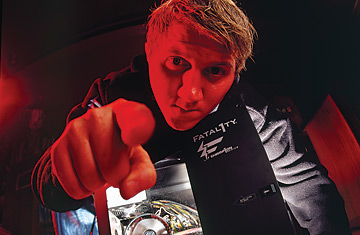
Professional video gamer Johnathan Wendel in his house in Kansas City, Kan.
Professional video gamer Jonathan (Fatal1ty) Wendel likes comparing himself to Tiger Woods, Michael Jordan and Tony Hawk. Wendel doesn't have a 350-yd. drive or a turnaround jumper, but he has dominated the PC-gaming field, winning 12 championships and collecting more than $500,000 in prize money and well over $1 million beyond that in sponsor deals. To prepare for big matches, Wendel says, he imports sparring partners from as far away as Finland, avoids alcohol and caffeine and runs a couple of miles a day. "Fitness is crucial," he says. "It's all about who has the most stamina and can think faster."
In likening himself to His Airness, Wendel is thinking past the rec room and into the boardroom. What Jordan did for sneakers, argues Wendel, Fatal1ty (pronounced fatality) can do for the sound card. To that end, Wendel has partnered with manufacturers like Creative, XFX, Abit and Zalman to put his stamp on a hardware line he claims will give aspiring gamers an edge. He and his associates will claim about $5 million in royalties for 2006. "I want to create a Fatal1ty brand that will last," says Wendel. He's talking not just mouse pads and motherboards but even apparel. His website touts hoodies embroidered with the Fatal1ty label as the "ultimate gaming accessory for the ultimate pro gamer."
Twitch athletes like Fatal1ty are trying to make a claim on sports programming and its rich merchandising spin-offs. There's already a built-in audience, and it's global. In 2006, combined sales of video and PC games hit $13.5 billion, a record for the industry and more than $4.5 billion above Hollywood's total box-office receipts. Competitive gaming is currently insignificant in that universe, with sales between $15 million and $20 million, according to industry consulting firm Parks Associates. But big players are entering the market. In January, DirecTV announced the formation of its own Championship Gaming Series. The matches will be viewable in 100 million homes worldwide, and the prize money will exceed $1 million.
The pro circuit has also birthed other official rankings and ventures, like Major League Gaming (MLG), which last year raised $35 million in venture capital. "Two years ago, selling pro gaming to cell-phone providers and soft-drink companies was difficult," says Mike Sepso, CEO of MLG. "But 2006 proved it was real. Tens of thousands came to our live events, and hundreds of thousands watched them." While MLG's revenue is growing, profitability is, at least for now, elusive.
Skepticism about whether pro gaming is a sport--as compared with, say, pro fishing--isn't as important as the question of whether gaming can appeal to viewers. There's a difference between watching Peyton Manning threading a touchdown pass and watching a gamer control a character doing something onscreen.
Leagues like MLG have their roots in pre-broadband underground circuits, in which players traveled the country to compete against one another. Sepso and his business partner were both sports and gaming fans, and in the nascent underground scene they saw the makings of something more. "It looked to us like an early NASCAR or an early X-Games," says Sepso, who at the time was running a broadband company. "It was compelling, so we bought in, and we got to know a lot of these young guys."
